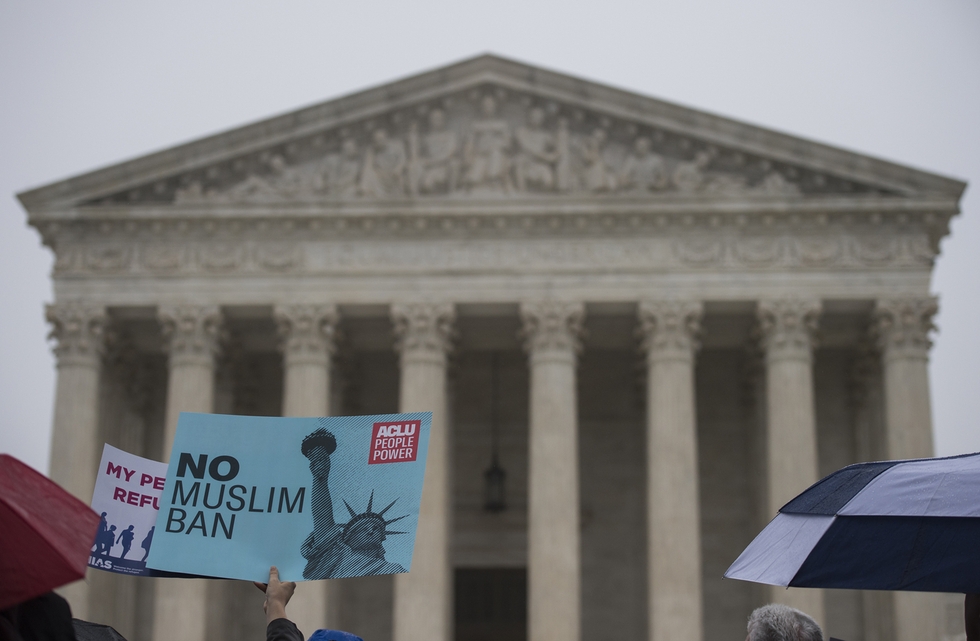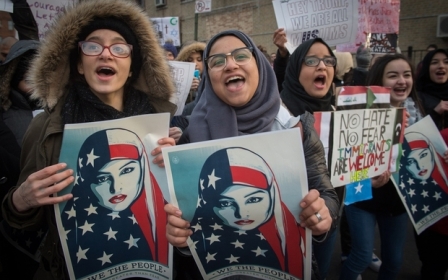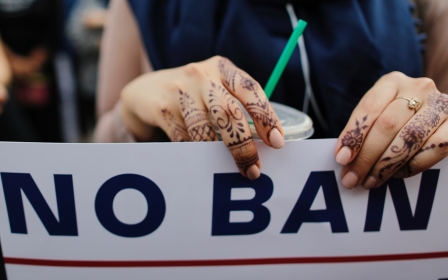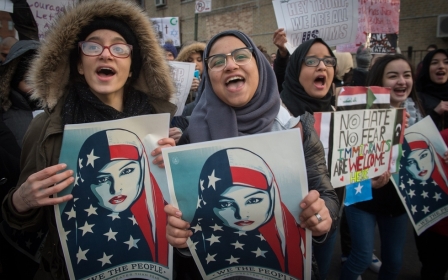Four reasons why US Supreme Court may uphold Trump 'Muslim ban'

NEW YORK, United States – Muslim rights activists left the Supreme Court looking defeated on Wednesday, after judges signalled they may uphold US President Donald Trump’s “Muslim ban” targeting travellers from several Muslim-majority countries.
To its critics, the ban is a sign of Trump’s enmity towards Muslims and one that violates federal immigration law and the US Constitution’s prohibition on the government privileging one faith over another.
But comments from judges during the hearing - on a bleak, rain-soaked day in Washington - indicated they may side with an administration that says it is protecting the US from militants in Middle Eastern and African hotspots.
“There’s a lot of anxiety,” Ryan Suto, from the Arab American Institute, a campaign group, told MEE.
“It’s not only practical, for those with family and friends abroad, but it’s also symbolic of whether the US welcomes people based on religion or origin. We’ve grappled with our better angels in the past, and had darker periods when we succumbed to fear and bigotry.”
The court is not likely to rule until the end of June, but rights campaigners offered Middle East Eye several reasons why the Supreme Court may allow Trump’s blanket ban on travellers from Iran, Libya, Somalia, Syria and Yemen.
1. On national security, Trump holds immense power
When it comes to the security of the US, judges are likely to side with the president and commander-in-chief because that role requires daily communication with intelligence chiefs and foreign leaders for the protection of every American.
For Jonathan Smith, a former Department of Justice civil rights lawyer who now works with Muslim Advocates, which filed documents for the hearing, this pushes the bar relatively high for those opposing the travel ban.
“Overcoming this presumption of deference to the executive presents its fair share of challenges,” Smith told MEE.
In Wednesday’s hearing, both Chief Justice John Roberts and Justice Anthony Kennedy, a frequent swing vote on the conservative-majority, nine-judge panel, showed reluctance to second-guess the president on national security justifications offered for the policy.
In one instance, Roberts questioned whether the president could be stopped from taking action on foreign emergencies, such as Syria’s civil war, if he is prevented from issuing policies that target specific countries.
2. The ban has had makeovers
One big question over the case is whether judges assess only what is before them – the third iteration of the travel ban – or either of its previous incarnations and the policy proposals Trump made on the campaign trail.
The third version of the ban, proclaimed in September, covered Venezuela and North Korea as well as most people from Iran, Libya, Somalia, Syria and Yemen, and was billed as an impartial, multi-agency assessment of threats to the US.
The challengers, led by the state of Hawaii, say judges must view the proclamation in the context of Trump’s earlier, campaign-trail rhetoric, including his call for “a total and complete shutdown of Muslims entering the United States”.
According to Smith, the outcome will be influenced by whether judges behave like “reasonable observers” and put events into a broader context or whether they only “look at the four corners of that document”.
Chad was on the list of countries targeted by Trump that was announced in September, but it was removed on 10 April. The restrictions on Venezuela and North Korea were not challenged in court.
3. Ugly precedents
The Supreme Court is all about fairness; etched on its portico are the words: “EQUAL JUSTICE UNDER LAW”. But that does not mean it has a spotless record of decision-making – particularly when ethnicity is involved.
In 1944, the court ruled that the internment of Japanese-Americans during World War II was constitutional. In the notorious Dred Scott case of 1857, judges found that blacks could not be considered US citizens, whether they were free or slaves.
“There’s a long line of cases of the Dred Scott iteration where the court has turned the other way in the face of a system of entrenched discrimination,” said Smith.
There’s a long line of cases of the Dred Scott iteration where the court has turned the other way in the face of a system of entrenched discrimination
- Jonathan Smith, Muslim Advocates
The internment ruling is seen as particularly relevant, as wartime judges allowed President Franklin Roosevelt’s detention of about 112,000 Japanese Americans after Japan’s hit on Pearl Harbor – an event with parallels to al-Qaeda’s 9/11 attacks.
“Hopefully now all observers look back on that Supreme Court case as wrongheaded and bigoted, but nonetheless it was decided that way,” Suto said. “The moral questions are perhaps clearer now, but the machinery of government may not take that direction in the short term.”
4. The judges were already leaning unfavourably
The US lower courts repeatedly ruled against Trump’s travel ban, but the Supreme Court carved out a different path with a series of provisional rulings in which it declined to strike down the Republican president’s orders.
On 4 December, Supreme Court judges signalled they may lean towards backing Trump when they granted on a 7-2 vote his administration’s request to let the ban go into full effect while the legal battles played out.
That pattern continued on Wednesday, with Trump’s own appointee to the court, Neil Gorsuch, questioning the case’s validity, and his conservative bedfellow Justice Samuel Alito Jr. saying the order “does not look at all like a Muslim ban”.
Outside the marble edifice, about 150 people demonstrated in the rain against the ban. Campaigners took to social media after the hearing; many predicted judges would side with Trump, perhaps with a 5-4 majority.
“It’s less pessimism than realism,” Zainab Arain, a researcher with the Council on American-Islamic Relations, a pressure group, told MEE. “There’s an underlying thread of hope, but you’re also cognizant of reality and there’s no way you can guarantee everything.”
Sirine Shebaya, a Lebanese-American civil rights lawyer with Muslim Advocates, noted that the travel ban was only one of many anti-immigrant policies from a White House staffed by folks with “explicitly anti-Muslim views”.
“I think we’ve seen a lot of really sort of discouraging things happening this year,” Shebaya told MEE. “It’s not surprising that a lot of advocates in the space might be feeling some pessimism.”
New MEE newsletter: Jerusalem Dispatch
Sign up to get the latest insights and analysis on Israel-Palestine, alongside Turkey Unpacked and other MEE newsletters
Middle East Eye delivers independent and unrivalled coverage and analysis of the Middle East, North Africa and beyond. To learn more about republishing this content and the associated fees, please fill out this form. More about MEE can be found here.




